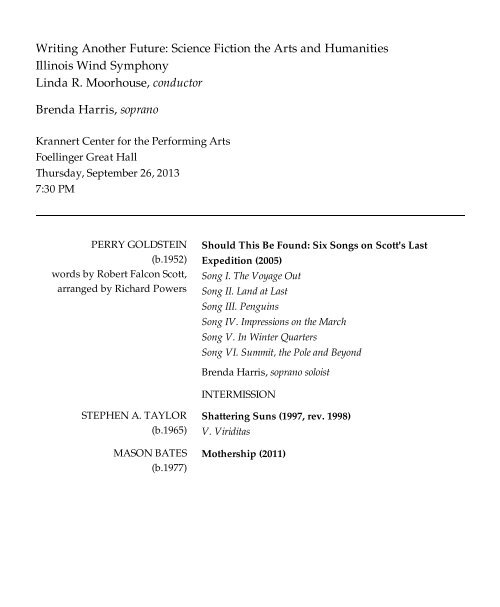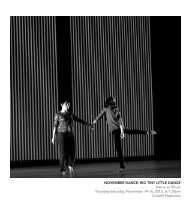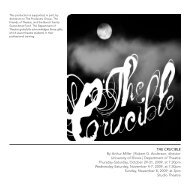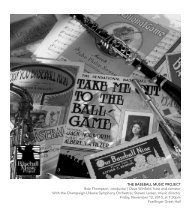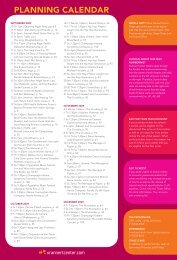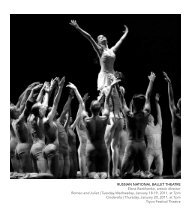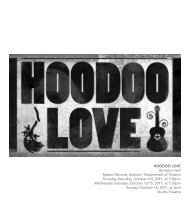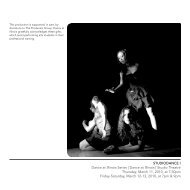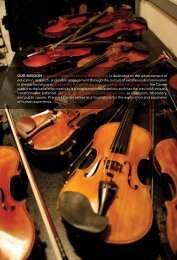Program - Krannert Center for the Performing Arts
Program - Krannert Center for the Performing Arts
Program - Krannert Center for the Performing Arts
Create successful ePaper yourself
Turn your PDF publications into a flip-book with our unique Google optimized e-Paper software.
Writing Ano<strong>the</strong>r Future: Science Fiction <strong>the</strong> <strong>Arts</strong> and HumanitiesIllinois Wind SymphonyLinda R. Moorhouse, conductorBrenda Harris, soprano<strong>Krannert</strong> <strong>Center</strong> <strong>for</strong> <strong>the</strong> Per<strong>for</strong>ming <strong>Arts</strong>Foellinger Great HallThursday, September 26, 20137:30 PMPERRY GOLDSTEIN(b.1952)words by Robert Falcon Scott,arranged by Richard PowersShould This Be Found: Six Songs on Scott's LastExpedition (2005)Song I. The Voyage OutSong II. Land at LastSong III. PenguinsSong IV. Impressions on <strong>the</strong> MarchSong V. In Winter QuartersSong VI. Summit, <strong>the</strong> Pole and BeyondBrenda Harris, soprano soloistINTERMISSIONSTEPHEN A. TAYLOR(b.1965)MASON BATES(b.1977)Shattering Suns (1997, rev. 1998)V. ViriditasMo<strong>the</strong>rship (2011)
PROGRAM NOTESShould This Be Found: Six Songs on Scott's Last Expedition (2005)In 1910, Robert Falcon Scott made his second expedition to Antarctica, determined to be <strong>the</strong> firstman to reach <strong>the</strong> South Pole. A successful journey required an 800-mile trek to <strong>the</strong> Pole (includingclimbing a glacier) in temperatures sometimes approaching 50 degrees below zero Fahrenheit, <strong>the</strong>n<strong>the</strong> arduous return. The five men who made <strong>the</strong> trek faced blizzards, fell in crevasses, experienceddehydration, starvation, frostbite, sun-blindness, and scurvy. For much of <strong>the</strong> expedition, <strong>the</strong>yhauled 200-pound sleds of equipment, sometimes restricted by ground and wea<strong>the</strong>r conditions to sixor seven miles a day of hard “manhauling.” When <strong>the</strong>y arrived at <strong>the</strong> Pole on January 17, 1912,<strong>the</strong>ir hope of being first were dashed upon discovering that Roald Amundsen and his Norwegianteam had preceded <strong>the</strong>m by thirty-three days. Disappointed, <strong>the</strong>y turned back. Petty Officer EdgarEvans “died quietly,” according to Scott, on February 17, presumably of a brain injury incurred byfalls into several crevasses. A month later, Captain Lawrence Oates (who had taken care of <strong>the</strong>ponies on <strong>the</strong> expedition), frostbitten and holding <strong>the</strong> men back, sacrificed himself by walking into ablizzard with <strong>the</strong> parting words “I am just going out and may be some time.” Captain Scott, Dr.Edward Wilson, and Lieutenant Henry “Bertie” Bowers trudged onward. One-hundred eighty-sixmiles from <strong>the</strong> base camp, and eleven miles from one of <strong>the</strong> depots that would have supplied foodand oil, <strong>the</strong>y succumbed in <strong>the</strong>ir tent and were discovered eight months later. Why <strong>the</strong>y couldn’t goon remains a mystery. Scott reports that <strong>the</strong>y were kept from pushing <strong>for</strong>ward by a blizzard thatraged <strong>for</strong> several days, although recent meteorological evidence suggests that <strong>the</strong>re could have beenno blizzard in that region lasting so long. Susan Solomon <strong>the</strong>orizes that <strong>the</strong> plan <strong>for</strong> Bowers andWilson to travel to <strong>the</strong> depot and return to Scott with food and oil seemed impractical, given Scott’sseverely frost-bitten condition, and that his two companions simply chose to die with <strong>the</strong>ir captainra<strong>the</strong>r than continue <strong>the</strong>ir trek.Discovered with <strong>the</strong> bodies was Scott’s journal, on which he wrote, “Send this diary to my wife.”The word “wife” is crossed out and replaced with <strong>the</strong> word “widow.” Scott’s journals makefascinating, harrowing, and deeply touching reading. The panoply of emotions he experienced isvividly represented by his excellent prose, and we find him by turns excited, defensive, insecure, andproud. He was insightful and sensitive, and his final letters to his wife and <strong>the</strong> families of <strong>the</strong> menwho died with him are heartrending. Whatever his skill as an explorer (and <strong>the</strong>re has been muchcriticism of <strong>the</strong> miscalculations that may have doomed <strong>the</strong> expedition), <strong>the</strong>re is no denying hisremarkable courage or that of his men, nor <strong>the</strong> spirit of affection and sacrifice that characterized<strong>the</strong>ir relationships. One can barely imagine what <strong>the</strong>y must have suffered; that <strong>the</strong>y remained“unendingly cheerful” even as <strong>the</strong>y faced certain death compels our admiration.Scott’s description of his expedition runs to nearly five-hundred pages. For <strong>the</strong> difficult task ofdistilling <strong>the</strong>se thousands of words into six song texts, I turned to one of our country’s most admiredand virtuoso novelists, Richard Powers. What a masterful job he has done! A composer could not
have better material with which to work and by which to be inspired. The texts evoke <strong>the</strong>excitement of <strong>the</strong> undertaking, <strong>the</strong> beauty of <strong>the</strong> Antarctic landscape, <strong>the</strong> humor of <strong>the</strong> penguins, <strong>the</strong>arduousness of <strong>the</strong> journey, <strong>the</strong> disappointment of dashed hopes, and <strong>the</strong> final days and hours oftranscendent courage. Humor, warmth, loyalty, patriotism, inventiveness, affection, andperseverance are commingled.On <strong>the</strong> structural level, <strong>the</strong> first five songs involve a recapitulation of opening or prominent material.Only <strong>the</strong> sixth is through-composed without recapitulation; <strong>the</strong> party does not return “home,” norcan <strong>the</strong> music. The first three songs are gesturally straight<strong>for</strong>ward, each section having its ownunambiguous character. As conditions become harsher and <strong>the</strong> men march toward <strong>the</strong>ir doom, <strong>the</strong>music takes on greater ambiguity and dissonance. “Impressions on <strong>the</strong> March” introduces bitonality(music in two keys at once), while “In Winter Quarters” presents music in contradictorytempos. “Summit, <strong>the</strong> Pole and Beyond” intensifies <strong>the</strong>se impressions of bi-tonality and conflictingtempi, while fur<strong>the</strong>ring <strong>the</strong> sense of dislocation by juxtaposing bits of music from all but one previoussong.“The Voyage Out” depicts <strong>the</strong> giddy excitement of <strong>the</strong> Terra Nova pushing off from <strong>the</strong> dock aftermonths of preparation, <strong>the</strong> energy of <strong>the</strong> work on board, and <strong>the</strong> mass of people gaily wavinggoodbye. The cycle’s most blatantly programmatic music depicts <strong>the</strong> near shipwreck in stormywea<strong>the</strong>r and <strong>the</strong> death of some of <strong>the</strong> ponies and dogs. The welcome appearance of <strong>the</strong> sun and <strong>the</strong>sighting of “some steep-walled berg, some patch of bluest sea” is rendered in luminous, undulatingmusical strokes, and <strong>the</strong> final stanza, lauding <strong>the</strong> crew and expressing hopeful expectations of asuccessful expedition, returns to <strong>the</strong> nautical, masculine strains of <strong>the</strong> song’s opening section.By contrast, “Land at Least” is a peaceful barcarole, depicting <strong>the</strong> gentle rocking of <strong>the</strong> boat, <strong>the</strong>beauty of Antarctica, <strong>the</strong> unloading of <strong>the</strong> cargo (including <strong>the</strong> ponies, so long confined, <strong>for</strong> whomScott has so much sympathy: “After <strong>the</strong> sledges came <strong>the</strong> ponies,” he writes. “Poor brutes, how glad<strong>the</strong>y must be to scratch <strong>the</strong>mselves!”) The last stanza glows with Scott’s description of <strong>the</strong> com<strong>for</strong>tof <strong>the</strong> hut <strong>the</strong>y’ve built, where “peace, quiet, and com<strong>for</strong>t reign supreme.”“Penguins” is a light-hearted intermezzo be<strong>for</strong>e <strong>the</strong> inexorable tragedy that binds <strong>the</strong> last three songsof <strong>the</strong> cycle. The men were charmed by <strong>the</strong> little Adelie penguins, who were compelled by curiosityto run up to <strong>the</strong> men when <strong>the</strong>y sang to <strong>the</strong>m but were so bashful that <strong>the</strong>y would run away when<strong>the</strong> men stopped. Scott misquotes a popular song from 1908 sung by <strong>the</strong> men to <strong>the</strong> penguins,“She’s Got Rings on Her Fingers,” which appears explicitly in <strong>the</strong> song. So does a brass rendition of“God Save <strong>the</strong> King,” which Cecil Meares would sing to <strong>the</strong> penguins in so off-pitch a manner that itnever failed to send <strong>the</strong>m fleeing back to <strong>the</strong> water. In <strong>the</strong> last stanza, <strong>the</strong> penguins walk pasthowling dogs, straining at <strong>the</strong>ir te<strong>the</strong>rs to tear <strong>the</strong>m apart. The sinister music that begins and ends<strong>the</strong> song represents <strong>the</strong> penguins’ last laugh. “‘Hello,’ [<strong>the</strong> penguins] seem to say, ‘here’s a game—
what do all you ridiculous things want? Oh that’s <strong>the</strong> sort of animal you are; well, you’ve come to<strong>the</strong> wrong place.’”“Impressions on <strong>the</strong> March” is a Mahlerian funeral march, with major/minor mode mixture and bitonality.Scott’s sympathy <strong>for</strong> <strong>the</strong> animals surfaces again, as it does throughout his writings and in<strong>the</strong>se songs. “The dogs are…tired to-night. Pa<strong>the</strong>tic to see <strong>the</strong> ponies floundering” is set in laboredrhythms. The tempo increases slightly as Scott records his observations about <strong>the</strong> sights and soundson <strong>the</strong> march, be<strong>for</strong>e describing “<strong>the</strong> eternal silence of <strong>the</strong> great white desert.”“In Winter Quarters” finds Scott learning of Roald Amundsen’s attempts to precede him to <strong>the</strong> Pole,and here, and throughout <strong>the</strong>se songs, his fears are quickly replaced by a strong sense of duty. Acontrasting “B” section sets Scott’s description of his fearless men in heroic terms, <strong>the</strong> brass anddrum music providing an exuberant respite from <strong>the</strong> increasingly dark circumstances of <strong>the</strong> doomedexpedition. Despite this moment of optimism, <strong>the</strong> hymns of <strong>the</strong> Morning Service, depicted in anoriginal chorale, “are not quite successful,” as Scott reflects on <strong>the</strong> fragility and insignificance of manin <strong>the</strong> cosmos. To describe <strong>the</strong> increasing contrast between <strong>the</strong>ir aspirations and increasinglydifficult circumstances, <strong>the</strong> score’s opening pages contain music in different tempos simultaneously:bassoons and marimba travel faster than <strong>the</strong> more lugubrious oboe when it enters with its solo.“Summit, <strong>the</strong> Pole and Beyond” is <strong>the</strong> final song and carries <strong>the</strong> cycle’s greatest burden of storytelling.Scott, always so sensitive to his animals, is <strong>for</strong>ced to kill <strong>the</strong> ponies <strong>for</strong> food, discoversAmundsen’s tent at <strong>the</strong> Pole, describes <strong>the</strong> death of two of his companions and muses on his wifeand son during his last moments. The various musical anomalies and uncom<strong>for</strong>table key and tempojuxtapositions that characterize <strong>the</strong> fourth and fifth songs are intensified in <strong>the</strong> sixth, as musicalreminiscences from all but one of <strong>the</strong> songs are heard. The last pages of <strong>the</strong> score aspire to a steelyand unsentimental beauty, with a simple repeated chord and a tolling of bells. It represents <strong>the</strong> wayI imagine Scott in his last hours, courageous to <strong>the</strong> last, accepting his fate. A calm settles over him,and he does not regret <strong>the</strong> fearful journey. “We took risks,” he writes in his “Message to <strong>the</strong> Public”in those last hours, “we knew we took <strong>the</strong>m; things have come out against us, and <strong>the</strong>re<strong>for</strong>e we haveno cause <strong>for</strong> complaint, but bow to <strong>the</strong> will of Providence, determined still to do our best to <strong>the</strong> last.”The composition of Should This Be Found took seven months and was completed on 29 December,2004. The parts were completed on January 17, 2005, 93 years to <strong>the</strong> day after Robert Falcon Scottand his men reached <strong>the</strong> South Pole. The work is dedicated to Sergeant First Class MaryKayMessenger, soprano, Colonel Thomas Rotondi, Jr., conductor, and <strong>the</strong> United States MilitaryAcademy Band at West Point.I am also pleased that this per<strong>for</strong>mance at <strong>the</strong> University of Illinois is a “homecoming” of sorts <strong>for</strong>me and <strong>for</strong> <strong>the</strong> arranger of <strong>the</strong> text, Richard Powers. For me, because I received my bachelor’s and
master’s degree from Illinois in <strong>the</strong> 1970’s; <strong>for</strong> Rick, because he was on <strong>the</strong> Illinois faculty, holding<strong>the</strong> Swanlund chair in English until his recent retirement. We met as students at Illinois, and aredelighted to return here many decades later <strong>for</strong> this per<strong>for</strong>mance of <strong>the</strong> piece.- note by Perry GoldsteinShattering Suns (1997, rev. 1998)Viriditas, a word coined by <strong>the</strong> Medieval abbess Hildegard von Bingen and more recently used by<strong>the</strong> writer Kim Stanley Robinson, describes <strong>the</strong> greening power of life expanding into <strong>the</strong> Universe.The final movement is a dance of life: a rhythmic outburst acting as a pendant to <strong>the</strong> chaoticexplosion of a dying star in <strong>the</strong> first movement. Mixed meters and fast, ascending scales combine toproduce a feeling of rushing <strong>for</strong>ward, joyfully, to meet <strong>the</strong> unknown.- note by Stephen TaylorMo<strong>the</strong>rship (2011)This energetic work imagines <strong>the</strong> orchestra as a mo<strong>the</strong>rship that is ‘docked’ by several visitingsoloists, who offer brief but virtuosic riffs on <strong>the</strong> work’s <strong>the</strong>matic material over action-packed electroacousticorchestral figuration. The piece follows <strong>the</strong> <strong>for</strong>m of a scherzo with double trio (as found in,<strong>for</strong> example, <strong>the</strong> Schumann Symphony No. 2). Symphonic scherzos historically play with dancerhythms in a high-energy and appealing manner, with <strong>the</strong> ‘trio’ sections temporarily exploring newrhythmic areas. Mo<strong>the</strong>rship shares a <strong>for</strong>mal connection with <strong>the</strong> symphonic scherzo but is broughtto life by thrilling sounds of <strong>the</strong> 21st Century — <strong>the</strong> rhythms of modern-day techno in place of waltzrhythms, <strong>for</strong> example. Commissioned and premiered by <strong>the</strong> YouTube Symphony at <strong>the</strong> SydneyOpera House, <strong>the</strong> piece showcases top individual players in its brief solo passages.- note by Mason Bates
SONG TEXT <strong>for</strong>Should This Be Found: Six Songs on Scott's Last ExpeditionShould This Be FoundTexts from <strong>the</strong> diaries of Robert Falcon ScottArranged by Richard PowersSong 1: The Voyage OutThe ship came out of dock,a scene of great industry.Men were building horse stalls,caulking <strong>the</strong> decks, resecuring <strong>the</strong> deckhouses.Not a single spot but had its band of workers.The [ship] pushed off from<strong>the</strong> jetty. A great mass of people,bright sunshine--very gay scene. Pennellswung <strong>the</strong> ship <strong>for</strong> compass adjustment, <strong>the</strong>n away.A day of great disaster,Plunging, taking much water,a great piece of bulwark carried clean away.The scene on deck was devastating.A dog was drowned last night. One pony dead,and two o<strong>the</strong>rs probably will go.The sun has appeared through breaksin <strong>the</strong> cloudy heavens, brilliantly illuminatingsome field of pack, some steep-walled berg,some patch of bluest sea. So sunlightand shadow have chased each o<strong>the</strong>r across our scene.The spirit of [our] enterprise is as bright as ever. Not a wordof complaint or anger has been heard on board.There is a rush to be first when work is done,desire to sacrifice [selfishness] to<strong>the</strong> success of <strong>the</strong> expedition. Fortune would be hardindeed if it allowed such knowledge, experience,ability, and enthusiasm to achieve nothing.
Song 2: Land at LastAfter many frowns, <strong>for</strong>tune has treated usto <strong>the</strong> kindest smile: A solid wharfon which to land our stores; <strong>the</strong> golden lighton this scene of mountain and ice....The landing: A week's work. After <strong>the</strong> sledgescame <strong>the</strong> ponies. Poor brutes,how glad <strong>the</strong>y must be to scratch <strong>the</strong>mselves!A message came from <strong>the</strong> ship to saythat all [<strong>the</strong>] stores had been landed. Nothing remainsbut mutton, books, pictures, and <strong>the</strong> pianola.The hut is becoming <strong>the</strong> most com<strong>for</strong>tabledwelling-place imaginable. We have made unto ourselvesa truly seductive home, within <strong>the</strong> walls of whichpeace, quiet, and com<strong>for</strong>t reign supreme.Song 3: PenguinsWilson went over <strong>the</strong> floeto capture some penguins.We saw <strong>the</strong> birds run up to him,<strong>the</strong>n rush away again.He says: "most comical and interesting;<strong>the</strong>y will always come up at a trot whenwe sing to <strong>the</strong>m.Explorers singing at <strong>the</strong> top of <strong>the</strong>ir voices to admiring penguins:'[Well] she's got bells on her fingers and rings on her toes,elephants to ride upon wherever she goes.[So come to your nabob and next Patrick’s Day.Be Mister Mumbo Jumbo Jijiboo J.Sure I’ve got rings on my fingers and bells on my toes,elephants to ride upon my little Irish Rose.So come to your nabob and and next Patrick’s Day.Be Mister Mumbo Jumbo Jijiboo J.’]
Meares is <strong>the</strong> greatest attraction: a full voicewhich is musical but always very flat.He declares that 'God save <strong>the</strong> King'will always send <strong>the</strong>m [back] to <strong>the</strong> water."They waddle <strong>for</strong>ward, poking <strong>the</strong>ir headsto and fro, in <strong>the</strong>ir odd way,in spite of a string of howling dogsstraining to get at <strong>the</strong>m.‘[Hello],’ <strong>the</strong>y seem to say, 'here's a game--what do all you ridiculous things want?Oh, that's <strong>the</strong> sort of animal you are;well, you've come to <strong>the</strong> wrong place.'(The first two lines of stanza three are from Wilson’s account of <strong>the</strong> explorers singing “She’s GotRings on Her Fingers,” a popular song by Maurice Scott, R.P. Weston, and F.J. Barnes published in1908. He misremembers <strong>the</strong> exact lyrics. I have added <strong>the</strong> chorus and ano<strong>the</strong>r verse of <strong>the</strong> song,using <strong>the</strong> correct lyrics.)Song 4: Impressions on <strong>the</strong> MarchThe hardening process must be good<strong>for</strong> animals though not <strong>for</strong> men.String of ponies progressing over <strong>the</strong> ice,following in each o<strong>the</strong>r's tracks.The dogs are…tired to-night.Pa<strong>the</strong>tic to see <strong>the</strong> ponies floundering.The small green tent and <strong>the</strong> great white road.The whine of a dog and <strong>the</strong> neigh of our steeds.The driving cloud of powdered snow.The crunch of footsteps which break <strong>the</strong> surface crust.The gentle flutter of our canvas shelter.Its deep booming under <strong>the</strong> full <strong>for</strong>ce of a blizzard.The eternal silence of <strong>the</strong> great white desert.The vast silence broken only by<strong>the</strong> mellow sounds of <strong>the</strong> marching column.
Song 5: In Winter QuartersHere <strong>the</strong> outward show is nothing,it is <strong>the</strong> inward purpose that counts.Every incident palesbe<strong>for</strong>e <strong>the</strong> startling contents of<strong>the</strong> mail: Amundsenestablished in <strong>the</strong> Bay of Whales.One thing only fixes in my mind:To go <strong>for</strong>ward and do our best<strong>for</strong> <strong>the</strong> honour of <strong>the</strong> countrywithout fear or panic.Wilson, withal ready and willing.Evans, with a clear-minded zeal.Bowers is <strong>the</strong> hardest travellerthat ever undertook a Polar journey.Oates' whole heart is in <strong>the</strong> ponies.Boys, all of <strong>the</strong>m, but such goodnaturedones. No friction at all.I do not think that harder men or bettertravellers ever took <strong>the</strong> trail.Held <strong>the</strong> usual Morning Service.Hymns not quite successful to-day.'Who is man and what his place,In <strong>the</strong> recklessness of space,What has he, this atom creature,In <strong>the</strong> infinitude of nature?' (Palgrave)Song 6: Summit, <strong>the</strong> Pole and BeyondWe kill ano<strong>the</strong>r pony to-morrow night. We have all takento horse meat. Sufficient <strong>for</strong> <strong>the</strong> day is <strong>the</strong> evil <strong>the</strong>reof.Our case is growing desperate. Yet, after all, one can go on striving.What castles one builds now hopefully…<strong>the</strong> Pole is ours.Oh! <strong>for</strong> a few fine days!
The worst has happened. A flag near <strong>the</strong> remainsof a camp: The Norwegians are first at <strong>the</strong> Pole.Great God! this is an awful place. Well, we have turnedour back on ambition and must face 800 miles of solid dragging.Evans shows signs of being played out; his woundssuppurate, broken down in brain, frostbitten,a wild look in his eyes. He died quietly.Beautiful day--too beautiful. We talk of little but food;Amongst ourselves we are unendingly cheerful, butwhat each man feels in his heart I can only guess.Oates lame this morning. We cannot help each o<strong>the</strong>r,can only say 'God help us!' and plod on our weary way.Should this be found I want <strong>the</strong>se facts recorded.Oates proposed we leave him. That we could not do.He said, 'I am just going outside and may be some time.'Every day we have been ready tostart <strong>for</strong> our depot 11 miles away,but outside <strong>the</strong> tent it remainsa scene of whirling drift.My thoughts are <strong>for</strong> my wife and boy.Had we lived, I should have had a taleto tell of <strong>the</strong> hardihood, endurance,and courage of my companionswhich would have stirred <strong>the</strong> heart....I do not think I can write more.For God's sake look after our people.Send this diary to my wife.Send this diary to my widow.What lots I could tell you of this journey.
THE COMPOSERSPerry Goldstein (born 1952 in New York City, New York) studied at <strong>the</strong> University of Illinois,UCLA, and Columbia University, from which he received a doctorate in music composition in 1986.His principal composition teachers at Illinois were Herbert Brün, Ben Johnston, and Paul Zonn; atColumbia, Chou Wen-Chung and Mario Davidovsky.A composer of vivid, high-intensity music, Goldstein’s various works have been called “an I-dareyou-contraption”(Total Absorption by Fanfare Magazine), “kinetic, percussive [and] pummeling” (OfPoints Fixed and Fluid by The New York Times), “a raw-boned tour-de-<strong>for</strong>ce” (Blow! by <strong>the</strong> BuffaloNews), and demonstrating “consummate structural artistry” (Mo<strong>the</strong>rless Child Variations by MusicVision CD Spotlight).He has written works <strong>for</strong> such notable per<strong>for</strong>mers as Juilliard Quartet cellist Joel Krosnick andpianist Gilbert Kalish, Emerson String Quartet violinist Phillip Setzer, pianist Eliza Garth, <strong>the</strong>Aurelia, Prism, and Capitol Saxophone Quartets, bass clarinetist Michael Lowenstern, saxophonistsCory Barnfield, Arno Bornkamp, Joseph Lulloff, and Kenneth Tse, <strong>the</strong> Escher String Quartet, and <strong>the</strong>United States Military Academy Band. His works appear on 17 compact discs, on <strong>the</strong> Albany,Bridge, Centaur, Challenge, Crystal, Innova, Mark Masters, New Dynamic, New World, UnitedStates Military, and Vanguard labels. He is published by Reed Music and Global Music FacilitiesPublications.Since 1992, he has been a member of <strong>the</strong> music faculty of <strong>the</strong> Stony Brook where he was <strong>the</strong>inaugural Director of <strong>the</strong> College of <strong>Arts</strong>, Culture, and Humanities and serves as Chairman of <strong>the</strong>Department of Music. He teaches music <strong>the</strong>ory, analysis, musicianship, and composition.Stephen Andrew Taylor is currently Associate Professor of Composition at <strong>the</strong> University of Illinois.His music often explores boundaries between art and science. His first orchestra commission,Unapproachable Light, inspired by images from <strong>the</strong> Hubble Space Telescope and <strong>the</strong> New Testament,was premiered by <strong>the</strong> American Composers Orchestra in 1996 in Carnegie Hall. O<strong>the</strong>r worksinclude <strong>the</strong> chamber quartet Quark Shadows, commissioned by <strong>the</strong> Chicago Symphony andpremiered in 2001; and Seven Memorials, a 32-minute cycle <strong>for</strong> piano inspired by <strong>the</strong> work of MayaLin and premiered by Gloria Cheng in Los Angeles, 2004; she also per<strong>for</strong>med <strong>the</strong> work atTanglewood in 2006. The Machine Awakes, a CD of his orchestra, chamber and electronic music wasreleased in 2010 on Albany Records; and Paradises Lost, a new opera based on a novella by Ursula K.Le Guin, was premiered in Portland, Oregon and at <strong>the</strong> University of Illinois in 2012.Besides composing <strong>for</strong> traditional instruments, Taylor also works with live electronics in pieces suchas Agoraphobia <strong>for</strong> flute, harp and electronics, premiered by Jonathan Keeble and Ann Yeung inMontreal in 2009. He is also active as a conductor with <strong>the</strong> Illinois Modern Ensemble, and as a
<strong>the</strong>orist, writing and lecturing on György Ligeti, Björk, and Radiohead. He also collaborates with <strong>the</strong>band Pink Martini and rock singer Storm Large.Born in 1965, he grew up in Illinois and studied at Northwestern and Cornell Universities, and <strong>the</strong>Cali<strong>for</strong>nia Institute of <strong>the</strong> <strong>Arts</strong>; his teachers include Steven Stucky, Karel Husa, Mel Powell, BillKarlins and Alan Stout. His music has won awards from Northwestern, Cornell, <strong>the</strong> ConservatoireAméricain de Fontainebleau, <strong>the</strong> American Academy of <strong>Arts</strong> and Letters, Composers, Inc., <strong>the</strong>Debussy Trio, <strong>the</strong> Howard Foundation, <strong>the</strong> College Band Directors National Association, <strong>the</strong> NewYork State Federation of Music Clubs, <strong>the</strong> Illinois <strong>Arts</strong> Council, <strong>the</strong> American Music <strong>Center</strong>, andASCAP. Among his commissions are works <strong>for</strong> Northwestern University, University of Illinois, <strong>the</strong>Syracuse Society <strong>for</strong> New Music, Pink Martini and <strong>the</strong> Oregon Symphony, <strong>the</strong> Quad CitySymphony, <strong>the</strong> Chicago Symphony, Quartet New Generation and <strong>the</strong> New Philharmonic, PianoSpheres, and <strong>the</strong> American Composers Orchestra.Mason Bates was raised in Virginia where he studied piano with Hope Armstrong Erb andcomposition with Dika Newlin, Bates enrolled in <strong>the</strong> Columbia-Juilliard program in New York City.Earning degrees in music composition and English literature, he studied primarily with JohnCorigliano and also with David Del Tredici and Samuel Adler. He worked with Edmund Campionat <strong>the</strong> University of Cali<strong>for</strong>nia, Berkeley, where <strong>the</strong> <strong>Center</strong> <strong>for</strong> New Music and Audio Technologiesbecame an important influence on his approach to electro-acoustic composition. Awards include <strong>the</strong>Heinz Award, <strong>the</strong> Rome and Berlin Prizes, a Charles Ives scholarship and fellowship from <strong>the</strong>American Academy of <strong>Arts</strong> and Letters, <strong>the</strong> Jacob Druckman Memorial Prize from Aspen MusicFestival, ASCAP and BMI awards, and fellowships from Tanglewood, Creative Capital and <strong>the</strong>Guggenheim Foundation.Bates was appointed by Music Director Riccardo Muti, along with Anna Clyne, as one of ChicagoSymphony Orchestra's Mead Composers-in-Residence and took up <strong>the</strong> post in <strong>the</strong> 2010/11 season<strong>for</strong> a term of two years. Maestro Muti extended both Bates's and Clyne's terms through <strong>the</strong> 2013/14season, which enables <strong>the</strong>m to develop fur<strong>the</strong>r <strong>the</strong> collaborations he has commenced with variouspartners in Chicago as well as new relationships.Bates has become a visible advocate <strong>for</strong> bringing new music to new spaces, whe<strong>the</strong>r throughinstitutional partnerships or through his classical/DJ project Mercury Soul, which has trans<strong>for</strong>medspaces ranging from commercial clubs to Frank Gehry-designed concert halls into exciting, hybridmusical events drawing over a thousand people. O<strong>the</strong>r collaborations include works toured by LevyDance. As a DJ, he often appears with upright bassist David Arend in spaces from San Francisco toBerlin, including Mezzanine, Temple, Volksbühne, John Colins and SFMOMA. (www.cso.org)
THE CONDUCTORDr. Linda R. Moorhouse joined <strong>the</strong> Illinois faculty in <strong>the</strong> fall of 2010 and currently serves as InterimDirector of Bands and Associate Professor of Music. Within <strong>the</strong> School of Music, she serves asconductor of <strong>the</strong> Illinois Wind Symphony and teaches courses in graduate and undergraduateconducting and graduate wind literature. Prior to her Illinois appointment, she served on <strong>the</strong> facultyat Louisiana State University <strong>for</strong> over 20 years, where she conducted <strong>the</strong> LSU Symphonic Winds,served as <strong>the</strong> primary instructor and drill designer of <strong>the</strong> award-winning Tiger Marching Band,taught instrumental conducting, and administered <strong>the</strong> LSU Summer Music Camps. She is also arecipient of numerous teaching awards, including <strong>the</strong> LSU Tiger Athletic Foundation’s “President’sAward” and “Undergraduate Teaching Award,” campus-wide awards <strong>for</strong> teaching excellence, inaddition to <strong>the</strong> LSU School of Music “Excellence in Teaching Award.”She has been honored by <strong>the</strong> John Philip Sousa Foundation with <strong>the</strong> Sudler “Order of Merit,” and byPhi Beta Mu with <strong>the</strong> “Outstanding Bandmaster” award <strong>for</strong> Louisiana. A distinguished MemberLaureate of Sigma Alpha Iota, international fraternity <strong>for</strong> women in music, Dr. Moorhouse hasreceived <strong>the</strong> “Citation of Excellence” from <strong>the</strong> National Band Association on numerous occasionsand <strong>the</strong> “Silver Baton” and “International Golden Rose” awards from <strong>the</strong> Women Band DirectorsInternational.Dr. Moorhouse maintains an active schedule having appeared as an adjudicator and guestconductor both nationally and internationally. An elected member of <strong>the</strong> prestigious AmericanBandmasters Association, she is a Past-President and currently Executive Secretary-Treasurer of <strong>the</strong>National Band Association, <strong>the</strong> world’s largest band organization. Dr. Moorhouse also serves as acontributing author <strong>for</strong> eight volumes of <strong>the</strong> Teaching Music Through Per<strong>for</strong>mance in Band series (GIAPublications), in addition to two volumes of A Composer’s Insight––Thoughts, Analysis andCommentary on Contemporary Masterpieces <strong>for</strong> Wind Band (Volumes 2 and 3, Meredith Music), andThe Music Director’s Cookbook (Meredith Music). She also serves as Editor of <strong>the</strong> NBA Journal.Dr. Moorhouse received a Bachelor of Music Education with Honors from <strong>the</strong> University of Florida,a Master of Music Education from LSU, and a Doctor of Musical <strong>Arts</strong> in Instrumental Conductingfrom <strong>the</strong> University of Washington. In September 2010, she was inducted into <strong>the</strong> University ofFlorida Bands Hall of Fame, and her biography appears in <strong>the</strong> New Grove Dictionary of Music andMusicians.
THE SOLOISTSoprano Brenda Harris appears in leading roles with many of <strong>the</strong> world’s most prominent operacompanies and orchestras. Recent stellar reviews have said that “Not only did she sing her highflyingarias with steely verve, she clearly communicated <strong>the</strong> character’s vulnerability and courage inequal measure,” (The Salt Lake Tribune) and “Pitch perfect, Harris exhibits a flawless legato with anaturalism that perfectly exemplifies <strong>the</strong> Bel Canto <strong>for</strong>m.” (The Examiner) Recent engagements havetaken her to <strong>the</strong> stages of The Metropolitan Opera, to Teatro Massimo in Palermo, Italy, WashingtonNational Opera at <strong>the</strong> Kennedy <strong>Center</strong>, New York City Opera, Opera du Rhin in Strasbourg,Michigan Opera Theatre, <strong>the</strong> Canadian Opera Company, Edmonton Opera and Opera Theatre of St.Louis, among o<strong>the</strong>rs.During <strong>the</strong> 2012 - 13 season, <strong>the</strong> soprano joins <strong>the</strong> Minnesota Opera as Abigaille in Nabucco, <strong>the</strong>Sarasota Opera as <strong>the</strong> title role in Turandot, and <strong>the</strong> Washington Concert Opera as Elisabetta inMaria Stuarda, whom she joined <strong>the</strong> previous season <strong>for</strong> Odabella in Verdi’s Attila. Additionalengagements during <strong>the</strong> 2011- 12 season included Leonora in Fidelio with Utah Opera, LadyMacbeth in Macbeth with <strong>the</strong> Anchorage Opera, and Donna Elvira in Don Giovanni with Des MoinesMetro Opera.Ms. Harris began <strong>the</strong> 2010-11 season singing <strong>the</strong> title role of Norma with Lyric Opera of Kansas City,prompting KC Metropolis to to write: “Norma exists as a vehicle <strong>for</strong> its singers and what aspectacular vehicle it is. Brenda Harris, in <strong>the</strong> title role, treated <strong>the</strong> audience on Saturday’s openingnight to a master class of vocal elegance and beauty.” Additional per<strong>for</strong>mances during <strong>the</strong> seasonincluded Elizabeth in Maria Stuarda with Minnesota Opera, and Madame Lidoine in Dialogue of <strong>the</strong>Carmelites with Des Moines Metro Opera. Reviews <strong>for</strong> her per<strong>for</strong>mance as <strong>the</strong> title role of Normawith Tulsa Opera included “Her per<strong>for</strong>mance was filled with moments that just about took <strong>the</strong>breath away.” (Tulsa World)During <strong>the</strong> previous season, she portrayed Lady Macbeth in Macbeth with Utah Opera, Opera LyraOttawa, and Des Moines Metro Opera, and Donna Anna in Don Giovanni with Lyric Opera ofKansas City where she “sang with remarkable emotional range, expressive power and raw beauty.”(Kansas City Star) Her Elisabetta in Roberto Devereux with Minnesota Opera received rave reviewsincluding “In soprano Brenda Harris <strong>the</strong> company has an Elizabeth of surpassing gifts, wholly equalto <strong>the</strong> rigors of <strong>the</strong> role,” (Star Tribune) and “Harris executed <strong>the</strong> golden and silver filigree <strong>the</strong> belcantosinging style demands with a thrilling control infused with <strong>the</strong> passionate discontent of aqueen wronged.” (Minn Post)During <strong>the</strong> 2008-2009 season, she portrayed Aga<strong>the</strong> in Der Freischutz with <strong>the</strong> Des Moines MetroOpera, The Governess in Turn of <strong>the</strong> Screw with <strong>the</strong> Portland Opera, and Anna Maurrant in StreetScene with <strong>the</strong> Chautauqua Opera where she “simply steals <strong>the</strong> show with her satinwood voice and
assured acting.” (The Chautauquan Daily) During <strong>the</strong> prior season she sang <strong>the</strong> title role in Toscawith Opera Cleveland, and <strong>the</strong>n joined <strong>the</strong> Austin Lyric Opera singing Wagner and Verdi selectionsin a Gala concert to mark <strong>the</strong> opening of <strong>the</strong>ir season. She sang Strauss’s Four Last Songs with <strong>the</strong>Austin Symphony and a program of Verdi selections with <strong>the</strong> Jacksonville Symphony.In <strong>the</strong> 2006-2007 season, Ms. Harris sang leading roles with opera companies across <strong>the</strong> continent,including <strong>the</strong> title role of Ariadne auf Naxos in a new production with <strong>the</strong> Utah Opera, and <strong>the</strong> titlerole of Norma with <strong>the</strong> Portland Opera, of which The Oregonian said “her 'Casta diva' had stillnessand poise, and she negotiated <strong>the</strong> subsequent coloratura with splendid fury.” Additionally, she sangLady MacBeth in Macbeth with both <strong>the</strong> Arizona Opera and Edmonton Opera, and Alice Ford inFalstaff with <strong>the</strong> Fort Worth Opera. On <strong>the</strong> concert stage she sang Daron Hagen’s Shining Brow with<strong>the</strong> Buffalo Symphony, Strauss’s Four Last Songs with <strong>the</strong> New Haven Symphony, Schubert’s MassNo. 6 in E-flat with <strong>the</strong> Music of <strong>the</strong> Baroque with Jane Glover, and participated in a Gala Concertwith <strong>the</strong> Stichting Veerhavenconcert in Rotterdam with Joel Levy. She was also featured in recital atBrenau University in Atlanta.During <strong>the</strong> 2005 – 2006 season, Ms. Harris sang <strong>the</strong> title role of Vanessa with both <strong>the</strong> TeatroMassimo in Palermo, Italy and <strong>the</strong> Chautauqua Opera, <strong>the</strong> title role in Mercadante's Orazi e Curiaziwith Minnesota Opera, <strong>the</strong> title role of Norma with Michigan Opera Theatre, Katerina in LadyMacbeth of Mtsensk with Austin Lyric Opera, and Violetta in La Traviata with Fort Worth Opera.With Maestro Keith Lockhart at <strong>the</strong> podium, Ms. Harris was a soloist <strong>for</strong> Vaughan Williams's A SeaSymphony with <strong>the</strong> Utah Symphony.Notable highlights of previous seasons include portraying Vitellia in La Clemenza di Tito with <strong>the</strong>Metropolitan Opera, <strong>the</strong> title role of Agrippina, Donna Anna in Don Giovanni and Arminda in LaFinta Giardiniera all with <strong>the</strong> New York City Opera, Chryso<strong>the</strong>mis in Strauss' Elektra with AustinLyric Opera, both <strong>the</strong> title role in Agrippina and Donna Anna in Don Giovanni at <strong>the</strong> WashingtonNational Opera at <strong>the</strong> Kennedy <strong>Center</strong>, and <strong>the</strong> title role in Norma with <strong>the</strong> Minnesota Opera,Portland Opera and Michigan Opera Theatre. With <strong>the</strong> Atlanta Opera she was <strong>the</strong> Countess in LeNozze di Figaro, Donna Elvira and Donna Anna in Don Giovanni, Desdemona in Otello, Violetta in LaTraviata,and Fiordiligi in Così fan tutte. She has appeared with <strong>the</strong> Canadian Opera Company asAminta in Il Re Pastore, <strong>the</strong> Montreal Opera as Donna Anna, <strong>the</strong> Edmonton Opera as both DonnaAnna and <strong>the</strong> Countess in Le Nozze di Figaro, <strong>the</strong> Vancouver Opera as Rosalinda, and <strong>the</strong> title role ofNorma with <strong>the</strong> Opera de Quebec.In Europe, Ms. Harris has appeared in Spoleto, Italy as Eva in Die Meistersinger, with Opera du Rhinin Strasbourg as both Vitellia in La Clemenza di Tito and as <strong>the</strong> title role of Barber's Vanessa. On <strong>the</strong>concert stage, she has per<strong>for</strong>med as a soloist with <strong>the</strong> St. Louis Symphony, <strong>the</strong> Orchestra of St.Luke's, Chicago's Music of <strong>the</strong> Baroque, Honolulu Symphony, Buffalo Philharmonic, and Boston
Baroque, and has offered numerous concerts at Carnegie Hall with <strong>the</strong> Oratorio Society of NewYork.Ms. Harris has made a habit of varying her career choices by successfully alternating 20th Centuryand contemporary music (Schoenberg's Moses und Aron, Strauss's Elektra, Kurt Weill's Street Scene,Barber's Vanessa, Hagen's Shining Brow, and Shostakovich's Lady MacBeth of Mtsensk) with <strong>the</strong> greatstandards (<strong>the</strong> title characters of Norma, Ariadne and Tosca, Alice Ford in Falstaff and LadyMacBeth in MacBeth, et al.) as well as <strong>the</strong> occasional Baroque masterpieces (Handel's Agrippina,Tolemeo, and Deidamia). In addition to <strong>the</strong>se, she has excelled in <strong>the</strong> dramatic bel canto roles ofDonizetti (Roberto Devereux, Maria Stuarda, Anna Bolena, Maria Padilla) and Rossini (Semiramide,Ermione, Armida).Brenda Harris has recorded leading roles <strong>for</strong> Newport Classic, including Scarlatti's Ishmael, Handel'sDeidamia, and Haydn's La Cantarina and The Creation, and on <strong>the</strong> Vox label, Handel's Tolomeo. Naxosreleased a recording of Shining Brow in <strong>the</strong> fall of 2008.
Illinois Wind Symphonyflute / piccoloAlexis Evers**Erin HappenyRocio LimaMora NoveyKathleen Winters*oboeLynn BurkheadSuzanne Segredo** (eng. horn)Johnny Smith**bassoonKa<strong>the</strong>rine Aydelott* (contra)Elliot Cobb**Axel SwisslerRachel RoothclarinetAlexander AthitakisDanielle Berger (contrabass)Jessica ClarkKaitlyn CurtisCharlotte DorseyMegan DuffyZandrea HafenrichterCarolyn Liao*Mitchell Lutz (bass)Samuel RomoCarrie WhitesaxophoneErik Elmgren** (alto)Robert Palermo** (alto)Nicki Roman** (alto)Pin-Hua Chen (tenor)Hyungryoul Kim (baritone)trumpetBenjamin Clemons**Donny de la RosaBen HarrisonChloe HolmesKeven Lewis*Robert PittmanhornCarly CharlesJennifer Kempe*Ali NizamaniBob O’SullivanTaylor SpontaktromboneDave Day**Adam Kosberg** (bass)Steven WolfAddison YoungbloodeuphoniumDoug BarrSpencer Hile*tubaKyle BaltzerMat<strong>the</strong>w Wilshire*Kelly NyquistpercussionDan BensonNik EricksonYi-Hsuan LinAlec LuedersCara MitchellTrent Shuey*pianoMiyeon ChoiharpChanah AmbuterbassHenry Chen* = principal** = co-principal
University of Illinois Bands StaffLinda R. Moorhouse, interim director of bandsBarry L. Houser, assistant director of athletic bandsJ. Ashley Jarrell, visiting assistant director of bandsElaine Li, bands per<strong>for</strong>mance collection librarianDaniel Michelsen, bands managerTerri Daniels, bands administrative coordinatorLana Custer, business associateBrian Coffill, graduate assistantChristopher Gass, graduate assistantPhilip Meyer, graduate assistantAkira Robles, graduate assistantBrad Wallace, graduate assistantUniversity of Illinois Bands Selected EventsSeptember 29, 2013, 3:00pm Illinois Wind Orchestra with Parkland Wind Ensemble, KCPAOctober 10, 2013, 7:30pm Hindsley Symphonic Band and University Concert Band, KCPAOctober 29, 2013, 7:30pm Illinois Wind Symphony, KCPAVisit <strong>the</strong> University of Illinois Bands at www.bands.illinois.eduBands at <strong>the</strong> University of IllinoisThe University of Illinois Band program is considered one of <strong>the</strong> most historic and significant collegeband programs in <strong>the</strong> world. The Band Division offers students several musical experiences throughour multiple concert bands, <strong>the</strong> popular 350-member Marching Illini, our basketball bands, <strong>the</strong>Orange & Blues Pep Band, and Summer Band, which begins its 104th season this next June. At <strong>the</strong><strong>for</strong>efront of band music education <strong>for</strong> over a century, <strong>the</strong> University of Illinois produced <strong>the</strong> firstcollege band program, setting standards <strong>for</strong> concert per<strong>for</strong>mance and marching band drill design,and producing prominent per<strong>for</strong>mers and music educators throughout <strong>the</strong> world.


